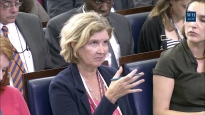President Obama on the Anniversary of Lehman's Fall
September 14, 2009 | 29:34
The President speaks in New York City on the one-year anniversary of the collapse of Lehman Brothers. He looks back at how we came back from the brink of depression, and looks forward at how we prevent irresponsible actions by financial institutions from ever endangering our economy again. September 14, 2009. (Public Domain)
Remarks by the President on Financial Rescue and Reform at Federal Hall
THE WHITE HOUSE
Office of the Press Secretary
__________________________________________________________________________
For Immediate Release September 14, 2009
__________________________________________________________________________
For Immediate Release September 14, 2009
REMARKS BY THE PRESIDENT
ON FINANCIAL RESCUE AND REFORM
ON FINANCIAL RESCUE AND REFORM
Federal Hall
New York, New York
New York, New York
11:59 A.M. EDT
THE PRESIDENT: Thank you very much. It is wonderful to be back in New York after having just been here last week. It is a beautiful day and we have some extraordinary guests here in the Hall today. I just want to mention a few.
First of all from my economic team, somebody who I think has done extraordinary work on behalf of all Americans and has helped to strengthen our financial system immeasurably, Secretary Tim Geithner -- please give him a big round of applause. (Applause.) Somebody who is continually guiding me and keeping me straight on the numbers, the chair of the Council of Economic Advisers, Christina Romer is here. (Applause.) We have an extraordinary economic recovery board and as chairman somebody who knows more about the financial markets and the economy generally than just about anybody in this country, Paul Volcker. Thank you, Paul. (Applause.) The outstanding mayor of the city of New York, Mr. Michael Bloomberg. (Applause.) We have Assembly Speaker Sheldon Silver is here, as well; thank you. (Applause.)
We have a host of members of Congress, but there's one that I have to single out because he is going to be helping to shape the agenda going forward to make sure that we have one of the strongest, most dynamic, and most innovative financial markets in the world for many years to come, and that's my good friend, Barney Frank. (Applause.) I also want to thank our hosts from the National Park Service here at Federal Hall and all the other outstanding public officials who are here.
Thanks for being here. Thank you for your warm welcome. It's a privilege to be in historic Federal Hall. It was here more than two centuries ago that our first Congress served and our first President was inaugurated. And I just had a chance to glance at the Bible upon which George Washington took his oath. It was here, in the early days of the Republic, that Hamilton and Jefferson debated how best to administer a young economy and ensure that our nation rewarded the talents and drive of its people. And two centuries later, we still grapple with these questions -- questions made more acute in moments of crisis.
It was one year ago today that we experienced just such a crisis. As investors and pension-holders watched with dread and dismay, and after a series of emergency meetings often conducted in the dead of the night, several of the world's largest and oldest financial institutions had fallen, either bankrupt, bought, or bailed out: Lehman Brothers, Merrill Lynch, AIG, Washington Mutual, Wachovia. A week before this began, Fannie Mae and Freddie Mac had been taken over by the government. Other large firms teetered on the brink of insolvency. Credit markets froze as banks refused to lend not only to families and businesses, but to one another. Five trillion dollars of Americans' household wealth evaporated in the span of just three months. That was just one year ago.
Congress and the previous administration took difficult but necessary action in the days and months that followed. Nonetheless, when this administration walked through the door in January, the situation remained urgent. The markets had fallen sharply; credit was not flowing. It was feared that the largest banks -- those that remained standing -- had too little capital and far too much exposure to risky loans. And the consequences had spread far beyond the streets of lower Manhattan. This was no longer just a financial crisis; it had become a full-blown economic crisis, with home prices sinking and businesses struggling to access affordable credit, and the economy shedding an average of 700,000 jobs every single month.
We could not separate what was happening in the corridors of our financial institutions from what was happening on the factory floors and around the kitchen tables. Home foreclosures linked those who took out home loans and those who repackaged those loans as securities. A lack of access to affordable credit threatened the health of large firms and small businesses, as well as all those whose jobs depended on them. And a weakened financial system weakened the broader economy, which in turn further weakened the financial system.
So the only way to address successfully any of these challenges was to address them together. And this administration, under the outstanding leadership of Tim Geithner and Christy Romer and Larry Summers and others, moved quickly on all fronts, initializing a financial -- a financial stability plan to rescue the system from the crisis and restart lending for all those affected by the crisis. By opening and examining the books of large financial firms, we helped restore the availability of two things that had been in short supply: capital and confidence. By taking aggressive and innovative steps in credit markets, we spurred lending not just to banks, but to folks looking to buy homes or cars, take out student loans, or finance small businesses. Our home ownership plan has helped responsible homeowners refinance to stem the tide of lost homes and lost home values.
And the recovery plan is providing help to the unemployed and tax relief for working families, all the while spurring consumer spending. It's prevented layoffs of tens of thousands of teachers and police officers and other essential public servants. And thousands of recovery projects are underway all across America, including right here in New York City, putting people to work building wind turbines and solar panels, renovating schools and hospitals, repairing our nation's roads and bridges.
Eight months later, the work of recovery continues. And though I will never be satisfied while people are out of work and our financial system is weakened, we can be confident that the storms of the past two years are beginning to break. In fact, while there continues to be a need for government involvement to stabilize the financial system, that necessity is waning. After months in which public dollars were flowing into our financial system, we're finally beginning to see money flowing back to taxpayers. This doesn't mean taxpayers will escape the worst financial crisis in decades entirely unscathed. But banks have repaid more than $70 billion, and in those cases where the government's stakes have been sold completely, taxpayers have actually earned a 17 percent return on their investment. Just a few months ago, many experts from across the ideological spectrum feared that ensuring financial stability would require even more tax dollars. Instead, we've been able to eliminate a $250 billion reserve included in our budget because that fear has not been realized.
While full recovery of the financial system will take a great deal more time and work, the growing stability resulting from these interventions means we're beginning to return to normalcy. But here's what I want to emphasize today: Normalcy cannot lead to complacency.
Unfortunately, there are some in the financial industry who are misreading this moment. Instead of learning the lessons of Lehman and the crisis from which we're still recovering, they're choosing to ignore those lessons. I'm convinced they do so not just at their own peril, but at our nation's. So I want everybody here to hear my words: We will not go back to the days of reckless behavior and unchecked excess that was at the heart of this crisis, where too many were motivated only by the appetite for quick kills and bloated bonuses. Those on Wall Street cannot resume taking risks without regard for consequences, and expect that next time, American taxpayers will be there to break their fall.
And that's why we need strong rules of the road to guard against the kind of systemic risks that we've seen. And we have a responsibility to write and enforce these rules to protect consumers of financial products, to protect taxpayers, and to protect our economy as a whole. Yes, there must -- these rules must be developed in a way that doesn't stifle innovation and enterprise. And I want to say very clearly here today, we want to work with the financial industry to achieve that end. But the old ways that led to this crisis cannot stand. And to the extent that some have so readily returned to them underscores the need for change and change now. History cannot be allowed to repeat itself.
So what we're calling for is for the financial industry to join us in a constructive effort to update the rules and regulatory structure to meet the challenges of this new century. That is what my administration seeks to do. We've sought ideas and input from industry leaders and policy experts, academics, consumer advocates, and the broader public. And we've worked closely with leaders in the Senate and the House, including not only Barney, but also Senators Chris Dodd and Richard Shelby, and Barney is already working with his counterpart, Sheldon [sic] Bachus. And we intend to pass regulatory reform through Congress.
And taken together, we're proposing the most ambitious overhaul of the financial regulatory system since the Great Depression. But I want to emphasize that these reforms are rooted in a simple principle: We ought to set clear rules of the road that promote transparency and accountability. That's how we'll make certain that markets foster responsibility, not recklessness. That's how we'll make certain that markets reward those who compete honestly and vigorously within the system, instead of those who are trying to game the system.
So let me outline specifically what we're talking about. First, we're proposing new rules to protect consumers and a new Consumer Financial Protection Agency to enforce those rules. (Applause.) This crisis was not just the result of decisions made by the mightiest of financial firms. It was also the result of decisions made by ordinary Americans to open credit cards and take on mortgages. And while there were many who took out loans they knew they couldn't afford, there were also millions of Americans who signed contracts they didn't fully understand offered by lenders who didn't always tell the truth.
This is in part because there is no single agency charged with making sure that doesn't happen. That's what we intend to change. The Consumer Financial Protection Agency will have the power to make certain that consumers get information that is clear and concise, and to prevent the worst kinds of abuses. Consumers shouldn't have to worry about loan contracts designed to be unintelligible, hidden fees attached to their mortgage, and financial penalties -- whether through a credit card or a debit card -- that appear without warning on their statements. And responsible lenders, including community banks, doing the right thing shouldn't have to worry about ruinous competition from unregulated competitors.
Now there are those who are suggesting that somehow this will restrict the choices available to consumers. Nothing could be further from the truth. The lack of clear rules in the past meant we had the wrong kind of innovation: The firm that could make its products look the best by doing the best job of hiding the real costs ended up getting the business. For example, we had "teaser" rates on credit cards and mortgages that lured people in and then surprised them with big rate increases. By setting ground rules, we'll increase the kind of competition that actually provides people better and greater choices, as companies compete to offer the best products, not the ones that are most complex or the most confusing.
Second, we've got to close the loopholes that were at the heart of the crisis. Where there were gaps in the rules, regulators lacked the authority to take action. Where there were overlaps, regulators often lacked accountability for inaction. These weaknesses in oversight engendered systematic, and systemic, abuse.
Under existing rules, some companies can actually shop for the regulator of their choice -- and others, like hedge funds, can operate outside of the regulatory system altogether. We've seen the development of financial instruments -- like derivatives and credit default swaps -- without anyone examining the risks, or regulating all of the players. And we've seen lenders profit by providing loans to borrowers who they knew would never repay, because the lender offloaded the loan and the consequences to somebody else. Those who refused to game the system are at a disadvantage.
Now, one of the main reasons this crisis could take place is that many agencies and regulators were responsible for oversight of individual financial firms and their subsidiaries, but no one was responsible for protecting the system as the whole -- as a whole. In other words, regulators were charged with seeing the trees, but not the forest. And even then, some firms that posed a "systemic risk" were not regulated as strongly as others, exploiting loopholes in the system to take on greater risk with less scrutiny. As a result, the failure of one firm threatened the viability of many others. We were facing one of the largest financial crises in history, and those responsible for oversight were caught off guard and without the authority to act.
And that's why we'll create clear accountability and responsibility for regulating large financial firms that pose a systemic risk. While holding the Federal Reserve fully accountable for regulation of the largest, most interconnected firms, we'll create an oversight council to bring together regulators from across markets to share information, to identify gaps in regulation, and to tackle issues that don't fit neatly into an organizational chart. We'll also require these financial firms to meet stronger capital and liquidity requirements and observe greater constraints on their risky behavior. That's one of the lessons of the past year. The only way to avoid a crisis of this magnitude is to ensure that large firms can't take risks that threaten our entire financial system, and to make sure that they have the resources to weather even the worst of economic storms.
Even as we've proposed safeguards to make the failure of large and interconnected firms less likely, we've also created -- proposed creating what's called "resolution authority" in the event that such a failure happens and poses a threat to the stability of the financial system. This is intended to put an end to the idea that some firms are "too big to fail." For a market to function, those who invest and lend in that market must believe that their money is actually at risk. And the system as a whole isn't safe until it is safe from the failure of any individual institution.
If a bank approaches insolvency, we have a process through the FDIC that protects depositors and maintains confidence in the banking system. This process was created during the Great Depression when the failure of one bank led to runs on other banks, which in turn threatened the banking system as a whole. That system works. But we don't have any kind of process in place to contain the failure of a Lehman Brothers or AIG or any of the largest and most interconnected financial firms in our country.
And that's why, when this crisis began, crucial decisions about what would happen to some of the world's biggest companies -- companies employing tens of thousands of people and holding trillions of dollars of assets -- took place in hurried discussions in the middle of the night. That's why we've had to rely on taxpayer dollars. The only resolution authority we currently have that would prevent a financial meltdown involved tapping the Federal Reserve or the federal treasury. With so much at stake, we should not be forced to choose between allowing a company to fail into a rapid and chaotic dissolution that threatens the economy and innocent people, or, alternatively, forcing taxpayers to foot the bill. So our plan would put the cost of a firm's failures on those who own its stock and loaned it money. And if taxpayers ever have to step in again to prevent a second Great Depression, the financial industry will have to pay the taxpayer back -- every cent.
Finally, we need to close the gaps that exist not just within this country but among countries. The United States is leading a coordinated response to promote recovery and to restore prosperity among both the world's largest economies and the world's fastest growing economies. At a summit in London in April, leaders agreed to work together in an unprecedented way to spur global demand but also to address the underlying problems that caused such a deep and lasting global recession. And this work will continue next week in Pittsburgh when I convene the G20, which has proven to be an effective forum for coordinating policies among key developed and emerging economies and one that I see taking on an important role in the future.
Essential to this effort is reforming what's broken in the global financial system -- a system that links economies and spreads both rewards and risks. For we know that abuses in financial markets anywhere can have an impact everywhere; and just as gaps in domestic regulation lead to a race to the bottom, so do gaps in regulation around the world. What we need instead is a global race to the top, including stronger capital standards, as I've called for today. As the United States is aggressively reforming our regulatory system, we're going to be working to ensure that the rest of the world does the same. And this is something that Secretary Geithner has already been actively meeting with finance ministers around the world to discuss.
A healthy economy in the 21st century also depends on our ability to buy and sell goods in markets across the globe. And make no mistake, this administration is committed to pursuing expanded trade and new trade agreements. It is absolutely essential to our economic future. And each time that we have met -- at the G20 and the G8 -- we have reaffirmed the need to fight against protectionism. But no trading system will work if we fail to enforce our trade agreements, those that have already been signed. So when -- as happened this weekend -- we invoke provisions of existing agreements, we do so not to be provocative or to promote self-defeating protectionism, we do so because enforcing trade agreements is part and parcel of maintaining an open and free trading system.
And just as we have to live up to our responsibilities on trade, we have to live up to our responsibilities on financial reform as well. I have urged leaders in Congress to pass regulatory reform this year and both Congressman Frank and Senator Dodd, who are leading this effort, have made it clear that that's what they intend to do. Now there will be those who defend the status quo -- there always are. There will be those who argue we should do less or nothing at all. There will be those who engage in revisionist history or have selective memories, and don't seem to recall what we just went through last year. But to them I'd say only this: Do you really believe that the absence of sound regulation one year ago was good for the financial system? Do you believe the resulting decline in markets and wealth and unemployment, the wrenching hardship that families are going through all across the country, was somehow good for our economy? Was that good for the American people?
I have always been a strong believer in the power of the free market. I believe that jobs are best created not by government, but by businesses and entrepreneurs willing to take a risk on a good idea. I believe that the role of the government is not to disparage wealth, but to expand its reach; not to stifle markets, but to provide the ground rules and level playing field that helps to make those markets more vibrant -- and that will allow us to better tap the creative and innovative potential of our people. For we know that it is the dynamism of our people that has been the source of America's progress and prosperity.
So I promise you, I did not run for President to bail out banks or intervene in capital markets. But it is important to note that the very absence of common-sense regulations able to keep up with a fast-paced financial sector is what created the need for that extraordinary intervention -- not just with our administration, but the previous administration. The lack of sensible rules of the road, so often opposed by those who claim to speak for the free market, ironically led to a rescue far more intrusive than anything any of us -- Democratic or Republican, progressive or conservative -- would have ever proposed or predicted.
At the same time, we have to recognize that what's needed now goes beyond just the reforms that I've mentioned. For what took place one year ago was not merely a failure of regulation or legislation; it wasn't just a failure of oversight or foresight. It was also a failure of responsibility -- it was fundamentally a failure of responsibility -- that allowed Washington to become a place where problems -- including structural problems in our financial system -- were ignored rather than solved. It was a failure of responsibility that led homebuyers and derivative traders alike to take reckless risks that they couldn't afford to take. It was a collective failure of responsibility in Washington, on Wall Street, and across America that led to the near-collapse of our financial system one year ago.
So restoring a willingness to take responsibility -- even when it's hard to do -- is at the heart of what we must do. Here on Wall Street, you have a responsibility. The reforms I've laid out will pass and these changes will become law. But one of the most important ways to rebuild the system stronger than it was before is to rebuild trust stronger than before -- and you don't have to wait for a new law to do that. You don't have to wait to use plain language in your dealings with consumers. You don't have to wait for legislation to put the 2009 bonuses of your senior executives up for a shareholder vote. You don't have to wait for a law to overhaul your pay system so that folks are rewarded for long-term performance instead of short-term gains.
The fact is, many of the firms that are now returning to prosperity owe a debt to the American people. They were not the cause of this crisis, and yet American taxpayers, through their government, had to take extraordinary action to stabilize the financial industry. They shouldered the burden of the bailout and they are still bearing the burden of the fallout -- in lost jobs and lost homes and lost opportunities. It is neither right nor responsible after you've recovered with the help of your government to shirk your obligation to the goal of wider recovery, a more stable system, and a more broadly shared prosperity.
So I want to urge you to demonstrate that you take this obligation to heart. To put greater effort into helping families who need their mortgages modified under my administration's homeownership plan. To help small business owners who desperately need loans and who are bearing the brunt of the decline in available credit. To help communities that would benefit from the financing you could provide, or the community development institutions you could support. To come up with creative approaches to improve financial education and to bring banking to those who live and work entirely outside of the banking system. And, of course, to embrace serious financial reform, not resist it.
Just as we are asking the private sector to think about the long term, I recognize that Washington has to do so as well. When my administration came through the door, we not only faced a financial crisis and costly recession, we also found waiting a trillion dollar deficit. So yes, we have to take extraordinary action in the wake of an extraordinary economic crisis. But I am absolutely committed to putting this nation on a sound and secure fiscal footing. That's why we're pushing to restore pay-as-you-go rules in Congress, because I will not go along with the old Washington ways which said it was okay to pass spending bills and tax cuts without a plan to pay for it. That's why we're cutting programs that don't work or are out of date. That's why I've insisted that health insurance reform -- as important as it is -- not add a dime to the deficit, now or in the future.
There are those who would suggest that we must choose between markets unfettered by even the most modest of regulations, and markets weighed down by onerous regulations that suppress the spirit of enterprise and innovation. If there is one lesson we can learn from last year, it is that this is a false choice. Common-sense rules of the road don't hinder the market, they make the market stronger. Indeed, they are essential to ensuring that our markets function fairly and freely.
One year ago, we saw in stark relief how markets can spin out of control; how a lack of common-sense rules can lead to excess and abuse; how close we can come to the brink. One year later, it is incumbent upon us to put in place those reforms that will prevent this kind of crisis from ever happening again, reflecting painful but important lessons that we've learned, and that will help us move from a period of reckless irresponsibility, a period of crisis, to one of responsibility and prosperity. That's what we must do. And I'm confident that's what we will do.
Thank you very much, everybody. (Applause.)
END
12:29 P.M. EDT
12:29 P.M. EDT
|
October 4, 2016
|
October 3, 2016
|
October 3, 2016
|
October 3, 2016
|
|
October 3, 2016
|
October 3, 2016
|
October 3, 2016
|
October 3, 2016
|
- &lsaquo previous
- …
- 17
- 18
- 19
- 20
- 21
- 22
- 23
- 24
- 25
- …
- next &rsaquo







